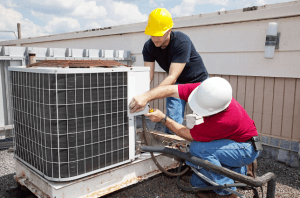As HVAC systems evolve in complexity and functionality, the need for specialized training becomes important. Professionals must go through advanced systems and technologies, which traditional training programs may not fully address, potentially leading to gaps in expertise and service quality.
Advanced HVAC system training is designed to bridge this gap, offering in-depth knowledge and hands-on experience with cutting-edge HVAC technologies. It’s tailored for those seeking to enhance their skills, including experienced technicians, industry newcomers aiming for rapid advancement, and specialists needing specific expertise. The training covers a range of courses, from sustainable energy solutions to smart home integration. It guides selecting the right course that aligns with individual career goals and industry trends.
In this guide, we’ll cover Advanced HVAC System Training, the kinds of courses you can take, and how to pick the best one for you.

What is Advanced HVAC System Training?
Advanced HVAC system training goes beyond basic heating, ventilation, and air conditioning knowledge. It teaches about the latest technologies in the field, like smart home integration, energy efficiency, and advanced system diagnostics. In these courses, technicians learn how to install, maintain, and repair the newest HVAC models and how to optimize them for performance and sustainability.
Why Is It Important?
This training is crucial because it ensures technicians can handle modern HVAC systems, which are more complex and technology-driven than older models. It helps technicians stay competitive in the job market, meet industry standards, and provide high-quality service to customers. Plus, with a focus on energy efficiency and environmentally friendly practices, advanced training supports the global shift towards sustainable living.
Who Should Get Advanced HVAC Training?
Advanced HVAC training is ideal for experienced technicians who want to upgrade their skills and stay current with the latest industry trends. It’s also beneficial for those aiming for higher positions in their companies or looking to specialize in certain areas, such as commercial HVAC systems or green energy solutions. Additionally, newcomers who are serious about a long-term career in HVAC can benefit from advanced training to fast-track their expertise and employability.
Typically Offered Advanced HVAC Courses
Advanced HVAC courses are designed to deepen the technical knowledge and skills of HVAC professionals.
Here are some of the top courses typically offered in advanced HVAC training programs:
- Sustainable Energy Solutions: Focuses on green energy technologies, including solar and geothermal HVAC systems, emphasizing energy conservation and sustainable practices in heating and cooling.
- Smart Home HVAC Integration: Teaches the integration of HVAC systems with home automation technologies, allowing technicians to manage and optimize heating and cooling systems remotely.
- Indoor Air Quality Management: Covers the latest methods and technologies for improving and maintaining indoor air quality, including air filtration, humidity control, and ventilation strategies.
- Commercial HVAC Systems Design: Offers in-depth knowledge on designing and implementing HVAC systems for commercial buildings, focusing on large-scale operations and energy efficiency.
- Advanced System Diagnostics and Repair: Provides comprehensive training on diagnosing and repairing complex issues in modern HVAC systems using the latest tools and diagnostic equipment.
- HVAC System Optimization: Teaches techniques for optimizing HVAC system performance, including system tuning, energy auditing, and performance analysis to ensure efficient operation and energy savings.
These courses provide HVAC technicians with the skills and knowledge needed to excel in the evolving HVAC industry, allowing them to implement the latest technologies and best practices.
How to Pick the Right HVAC Advanced Course
Choosing the right advanced HVAC course involves considering your career goals, current skills, and the specific needs of the HVAC market.
Here are steps to help you pick the appropriate course:
- Assess Your Current Skills and Experience: Evaluate your existing knowledge and experience in HVAC to determine what areas you need to improve or specialize in. This assessment will guide you in selecting a course that complements your skills and fills any gaps.
- Identify Your Career Objectives: Think about your long-term career goals. Are you aiming for a specialization in a particular area, such as renewable energy systems or commercial HVAC? Your goals will influence the type of advanced training you should pursue.
- Research Available Courses: Look for courses well-regarded in the HVAC community and recognized by industry bodies. Check the curriculum to ensure it covers the latest technologies and practices in HVAC and it aligns with your career objectives.
- Consider Course Flexibility and Format: Depending on your work schedule and personal commitments, you may prefer online courses, night classes, or intensive workshops. Look for a training program that fits your lifestyle and learning preferences.
- Evaluate the Instructors’ Expertise: The quality of an advanced HVAC course is often reflected in the expertise of its instructors. Research their credentials, experience, and reputation in the HVAC industry to ensure you’re learning from knowledgeable professionals.
- Check for Certification and Accreditation: Ensure the course offers a certification that is recognized in the HVAC industry and can enhance your professional credibility. Accreditation from a reputable organization adds value to the training and can be beneficial for career advancement.
- Read Reviews and Testimonials: Learning from the experiences of past students can provide insights into the course’s effectiveness and whether it meets its promises. Look for reviews and testimonials to gauge the satisfaction of former participants.
By carefully considering these factors, you can select an advanced HVAC course that not only meets your professional development needs but also enhances your expertise and competitiveness in the field.

